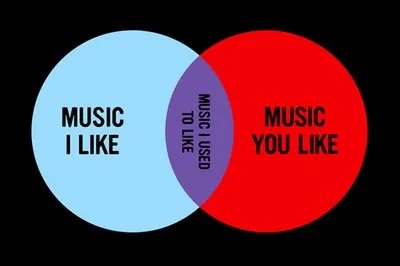 I have managed to get a hold of the most important and rare cds in the gothic country genre. Nevertheless, there are still a couple of cds that eludes me. I practise several methods. The first method is systematic and random trawling. The second method is monitoring through wantlists, wishlists and saved searches. The third method is just contacting, stalking and harassing people. Wishlists (or wantlists) in particular seems to have become an obsolete method. The cds are just names on a list, year after year. They never come up for sale any more. Of course, the difficulty level is already high: limited editions, small markets and self-released albums. The wishlist is dead. At least, when it comes to finding cds. I don't have an unambigious explanation. But, I have some theories. First, cds are drying up. Very few cds are manufactured and sold today. However, 95 percent of the cds I'm interested in were released between 2001-2010. Second, wishlists may have become outdated and irrelevant. Other tools may have replaced wishlists. I can't find any support that ChatGPT or MS copilot or some other figment have taken over. In theory, the wishlists still retains its function of bringing buyers and seller together. Third, a new point of equlibrium has been established. The cds are still out there, but stored in cardboxes in people's closets. They are kept there for nostalgic reasons (which I respect) or idleness (which I don't respect). The owners don't have the strength or energy to put them out for sale. I will believe this theory until it inevitably gets confirmed. It's only a matter of time. In economic theory, equilibrium price emerges when the consumers demand (Qd) matches the sellers supply (Qs), Qd = Qs. The new equilibrium formula is Qd = Qs + i, where i is an idleness component.
I have managed to get a hold of the most important and rare cds in the gothic country genre. Nevertheless, there are still a couple of cds that eludes me. I practise several methods. The first method is systematic and random trawling. The second method is monitoring through wantlists, wishlists and saved searches. The third method is just contacting, stalking and harassing people. Wishlists (or wantlists) in particular seems to have become an obsolete method. The cds are just names on a list, year after year. They never come up for sale any more. Of course, the difficulty level is already high: limited editions, small markets and self-released albums. The wishlist is dead. At least, when it comes to finding cds. I don't have an unambigious explanation. But, I have some theories. First, cds are drying up. Very few cds are manufactured and sold today. However, 95 percent of the cds I'm interested in were released between 2001-2010. Second, wishlists may have become outdated and irrelevant. Other tools may have replaced wishlists. I can't find any support that ChatGPT or MS copilot or some other figment have taken over. In theory, the wishlists still retains its function of bringing buyers and seller together. Third, a new point of equlibrium has been established. The cds are still out there, but stored in cardboxes in people's closets. They are kept there for nostalgic reasons (which I respect) or idleness (which I don't respect). The owners don't have the strength or energy to put them out for sale. I will believe this theory until it inevitably gets confirmed. It's only a matter of time. In economic theory, equilibrium price emerges when the consumers demand (Qd) matches the sellers supply (Qs), Qd = Qs. The new equilibrium formula is Qd = Qs + i, where i is an idleness component.
 I do appreciate a rich quality of sound. Despite this weakness, I have never felt an urge to cross over to the dark side. To the unfriendly, unhelpful and unforgiven world of audiophiles. There's nothing for you there. However, there's no rule without exception. Recently, I found a website called Headphonesty (opens in a new window). This website manages to combine facts, tests, comparisons with, lo and behold, debunking audiophile myths (and there are plenty of them). It's like if a magician would reveal magic tricks. Not approved by the Guild. In the audiophile world, music always comes last. Headphonesty places the music in the center. My first encounter with audiophilia was unexpected. When I was in upper secondary school, I had a blue collar extra job. No formal training or experience, only connections. There, I worked with a disembarked merchant fleet sailor. He was about 30 years old, but behaved childishly and irresponsibly. He talked constantly and drove quite a few people mad with his gibberish. He was also a pathological liar with addictive issues. One day I was invited to his small and crummy apartment in the outskirts of the inner city of Stockholm. He wanted to show me his stereo. Much to my surprise, he actually had a very expensive high-end stereo in his possession. If I remember correctly, he had inherited money from his father (true or false) and spent them on this stereo. He only owned one vinyl album, Pink Floyd's "Dark Side of the Moon". And it wasn't a thin and warped oil-crisis vinyl record. It was an audiophile vinyl. I feel uncomfortable in admitting that it sounded heavenly. It doesn't take much to make a home inviting. Ohm sweet ohm.
I do appreciate a rich quality of sound. Despite this weakness, I have never felt an urge to cross over to the dark side. To the unfriendly, unhelpful and unforgiven world of audiophiles. There's nothing for you there. However, there's no rule without exception. Recently, I found a website called Headphonesty (opens in a new window). This website manages to combine facts, tests, comparisons with, lo and behold, debunking audiophile myths (and there are plenty of them). It's like if a magician would reveal magic tricks. Not approved by the Guild. In the audiophile world, music always comes last. Headphonesty places the music in the center. My first encounter with audiophilia was unexpected. When I was in upper secondary school, I had a blue collar extra job. No formal training or experience, only connections. There, I worked with a disembarked merchant fleet sailor. He was about 30 years old, but behaved childishly and irresponsibly. He talked constantly and drove quite a few people mad with his gibberish. He was also a pathological liar with addictive issues. One day I was invited to his small and crummy apartment in the outskirts of the inner city of Stockholm. He wanted to show me his stereo. Much to my surprise, he actually had a very expensive high-end stereo in his possession. If I remember correctly, he had inherited money from his father (true or false) and spent them on this stereo. He only owned one vinyl album, Pink Floyd's "Dark Side of the Moon". And it wasn't a thin and warped oil-crisis vinyl record. It was an audiophile vinyl. I feel uncomfortable in admitting that it sounded heavenly. It doesn't take much to make a home inviting. Ohm sweet ohm.
 Slackeye Slim is either on or off. At least, that's how it looks from the outside. Very intense and productive periods are followed by introversion and silence. The activity level is hard to follow since the artist's social media activities are on/off. However, Slackeye Slim has apparently been busy lately. A cover EP is coming out, he is working on a new musical project, and also working on a film score. In this blog post we will focus on the EP. It will be released by Perpetual Doom Records. Slackeye Slim writes on his website: "I'm calling it the Perpetual Doom EP because, well, isn't perpetual doom a good way to describe how the rational among us feel anyway?... The Perpetual Doom EP is a collection of six cover songs that I reworked and adopted as my own. I've wanted to record a handful of covers for a long time, but I didn't have a reason to do it until I was asked by Perpetual Doom. It ended up being one of the most fun projects I've ever done. It allowed me to think about the songs and artists that were the most influential to me and reimagine these songs as though I wrote them." The covered songs are an odd bunch: "Cowboy Dan" (Modest Mouse), "Cold Cold Ground" (Tom Waits), "Heel on the Shovel" (16 Horsepower), "Climbing Up the Walls" (Radiohead), "Anthem" (Leonard Cohen) and "Mack the Knife" (Kurt Weill via Louis Armstrong). Slackeye Slim continue on his website: "For this EP, I recorded everything through a shitty old Shure mic preamp that I found in the dump in Wisconsin a long time ago and recently fixed at my kitchen table. The EP has got a nice lofi quality throughout and I'm very happy with how it all turned out." I'm trained according to the inverted pyramid model. It helps to arrange content logically and keep the reader focused on the main message. Information should be arranged in order of importance. In the text from Slackeye Slim the most important message comes last: "Oh yeah, and I'm still slowly writing for a new album. Like I said, I've been busy. Stay tuned. This is going to be a good year in the Slackeye Slim camp."
Slackeye Slim is either on or off. At least, that's how it looks from the outside. Very intense and productive periods are followed by introversion and silence. The activity level is hard to follow since the artist's social media activities are on/off. However, Slackeye Slim has apparently been busy lately. A cover EP is coming out, he is working on a new musical project, and also working on a film score. In this blog post we will focus on the EP. It will be released by Perpetual Doom Records. Slackeye Slim writes on his website: "I'm calling it the Perpetual Doom EP because, well, isn't perpetual doom a good way to describe how the rational among us feel anyway?... The Perpetual Doom EP is a collection of six cover songs that I reworked and adopted as my own. I've wanted to record a handful of covers for a long time, but I didn't have a reason to do it until I was asked by Perpetual Doom. It ended up being one of the most fun projects I've ever done. It allowed me to think about the songs and artists that were the most influential to me and reimagine these songs as though I wrote them." The covered songs are an odd bunch: "Cowboy Dan" (Modest Mouse), "Cold Cold Ground" (Tom Waits), "Heel on the Shovel" (16 Horsepower), "Climbing Up the Walls" (Radiohead), "Anthem" (Leonard Cohen) and "Mack the Knife" (Kurt Weill via Louis Armstrong). Slackeye Slim continue on his website: "For this EP, I recorded everything through a shitty old Shure mic preamp that I found in the dump in Wisconsin a long time ago and recently fixed at my kitchen table. The EP has got a nice lofi quality throughout and I'm very happy with how it all turned out." I'm trained according to the inverted pyramid model. It helps to arrange content logically and keep the reader focused on the main message. Information should be arranged in order of importance. In the text from Slackeye Slim the most important message comes last: "Oh yeah, and I'm still slowly writing for a new album. Like I said, I've been busy. Stay tuned. This is going to be a good year in the Slackeye Slim camp."
 A side effect of listening to music too long are reduced ability to concentrate and reduced attention and focus. Extensive and intensive listening ultimately leads to snobbism. "Snobbism is an inextricable mixture of pride and meanness" wrote René Girard, a French-American historian, literary critic and philosopher. This is not just applicable to high culture, it's also applicable for popular culture. In the hilarious book "High Fidelity" by Nick Hornby, the record store owner and his two employees agree that "What really matters is what you like, not what you are like". I'm not free from guilt. Sometimes, when someone asks me about my obscure music taste, I can say diminishing things like "it's an aquired taste" or "it's not for everyone" or "there is nothing for you here". Other times, I'm more helpful and instructive. "Think about a breed between Hank Williams and Nick Cave". However, in most cases this doesn't work. People don't understand the reference. They don't know who Hank Williams was or who Nick Cave is. In the worst case scenario, they don't know about any of them. You are back to square one. I have a very strong suspicion towards people that don't listen to music (in general) and people pretending to listen to music (in particular) and furthermore have bad musical taste when forced to say something. This is not mere snobbism. It's a coping strategy.
A side effect of listening to music too long are reduced ability to concentrate and reduced attention and focus. Extensive and intensive listening ultimately leads to snobbism. "Snobbism is an inextricable mixture of pride and meanness" wrote René Girard, a French-American historian, literary critic and philosopher. This is not just applicable to high culture, it's also applicable for popular culture. In the hilarious book "High Fidelity" by Nick Hornby, the record store owner and his two employees agree that "What really matters is what you like, not what you are like". I'm not free from guilt. Sometimes, when someone asks me about my obscure music taste, I can say diminishing things like "it's an aquired taste" or "it's not for everyone" or "there is nothing for you here". Other times, I'm more helpful and instructive. "Think about a breed between Hank Williams and Nick Cave". However, in most cases this doesn't work. People don't understand the reference. They don't know who Hank Williams was or who Nick Cave is. In the worst case scenario, they don't know about any of them. You are back to square one. I have a very strong suspicion towards people that don't listen to music (in general) and people pretending to listen to music (in particular) and furthermore have bad musical taste when forced to say something. This is not mere snobbism. It's a coping strategy.
 Christian Williams has picked up his trusty old Martin guitar again. This is surprising news since he changed his musical style to experimental electronica many years ago. Before this sharp and unexpected turn, he released five gothic folk (or gothic country if you prefer) albums between 2007-2008. Christian Williams is one of my absolute favorites in the genre. Three years ago he began a new recording project, an off and on project that takes time. According to the artist, the easy part is coming up with ideas; the hard part is shifting through all of that and figuring out what’s worth working with for an album. Now it seems like the project has regained its momentum. Actually, you can follow its progress in real time at Bandcamp, click here (opens in a new window). Christian Williams writes on Bandcamp: "In late 2024, I began writing new songs again after an almost 15 year hiatus. This process has continued into 2025 and my first album of original music since 2009 is starting to take shape. In an effort to both share these new songs as they evolve and also motivate myself to see this album through to completion, I've decided to share the demos of each song as I write them. These will be barebones recordings of just my voice and guitar as I move these songs along from ideas on paper to something I can continue to listen to and tweak. At this point, I don't know which of these songs will make it onto the final album, but you'll be able to follow me through the process of making those decisions through this project. I'll continue to add new songs as they're ready to be shared so be sure to bookmark this page and check back every week or so to see when a new song has been added. The newest song will be at the top of the track listing. As long as the inspiration continues to strike, I'll keep writing new songs and hopefully by the end of 2025 I'll have a nice selection of diamonds in the rough to polish for the new album, which I'm tentatively calling "No Wrong Answers."
Christian Williams has picked up his trusty old Martin guitar again. This is surprising news since he changed his musical style to experimental electronica many years ago. Before this sharp and unexpected turn, he released five gothic folk (or gothic country if you prefer) albums between 2007-2008. Christian Williams is one of my absolute favorites in the genre. Three years ago he began a new recording project, an off and on project that takes time. According to the artist, the easy part is coming up with ideas; the hard part is shifting through all of that and figuring out what’s worth working with for an album. Now it seems like the project has regained its momentum. Actually, you can follow its progress in real time at Bandcamp, click here (opens in a new window). Christian Williams writes on Bandcamp: "In late 2024, I began writing new songs again after an almost 15 year hiatus. This process has continued into 2025 and my first album of original music since 2009 is starting to take shape. In an effort to both share these new songs as they evolve and also motivate myself to see this album through to completion, I've decided to share the demos of each song as I write them. These will be barebones recordings of just my voice and guitar as I move these songs along from ideas on paper to something I can continue to listen to and tweak. At this point, I don't know which of these songs will make it onto the final album, but you'll be able to follow me through the process of making those decisions through this project. I'll continue to add new songs as they're ready to be shared so be sure to bookmark this page and check back every week or so to see when a new song has been added. The newest song will be at the top of the track listing. As long as the inspiration continues to strike, I'll keep writing new songs and hopefully by the end of 2025 I'll have a nice selection of diamonds in the rough to polish for the new album, which I'm tentatively calling "No Wrong Answers."
 What can I say? I have listened to the raw songs on Bandcamp and it's almost to good to be true. Christian Williams still got his songwriting skills left intact. The same goes for his dark baritone voice. However, a man cannot step into the same river twice, because it is not the same river, and he is not same man. In an e-mail Christian Wiliams explains: "For several years now, I've been trying to tap back into the creative mindset that helped me make "Built with Bones" and my other albums and I'm starting to realize that's been holding me back from writing anything new. I think I needed distance from those songs and what inspired them and allow myself to get inspired anew - to find a different creative mindset to work from. I'm starting to find that again in this uncertain world we're living in now. I suppose like any good "gothic country" songwriter worth his salt, I draw inspiration from troubling times whether they be personal or as a reaction to the world around me. "Built with Bones" and my first songs were mostly inspired by my own troubling times; these new songs are shaping up to be inspired by the troubled world we now find ourselves living in." This recording project is a beacon in itself. Christian Williams still got the powers within him. I never gave up hope. A new gothic country album from Christian Williams has been in my "What to expect and wish for in 20XX" blog entries for many years. I hope and wish that he has the inspiration, time and energy to complete these recordings.
What can I say? I have listened to the raw songs on Bandcamp and it's almost to good to be true. Christian Williams still got his songwriting skills left intact. The same goes for his dark baritone voice. However, a man cannot step into the same river twice, because it is not the same river, and he is not same man. In an e-mail Christian Wiliams explains: "For several years now, I've been trying to tap back into the creative mindset that helped me make "Built with Bones" and my other albums and I'm starting to realize that's been holding me back from writing anything new. I think I needed distance from those songs and what inspired them and allow myself to get inspired anew - to find a different creative mindset to work from. I'm starting to find that again in this uncertain world we're living in now. I suppose like any good "gothic country" songwriter worth his salt, I draw inspiration from troubling times whether they be personal or as a reaction to the world around me. "Built with Bones" and my first songs were mostly inspired by my own troubling times; these new songs are shaping up to be inspired by the troubled world we now find ourselves living in." This recording project is a beacon in itself. Christian Williams still got the powers within him. I never gave up hope. A new gothic country album from Christian Williams has been in my "What to expect and wish for in 20XX" blog entries for many years. I hope and wish that he has the inspiration, time and energy to complete these recordings.
